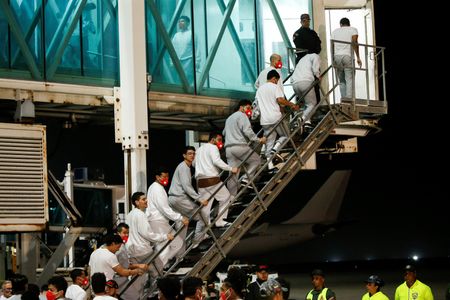By Andrew Chung
(Reuters) -The U.S. Supreme Court again cleared the way on Friday for Donald Trump's administration to revoke a temporary legal protection for hundreds of thousands of Venezuelan migrants in the United States, backing a key priority of the Republican president as he pursues a policy of mass deportations.
The justices granted the administration's request to put on hold a judge's ruling that Homeland Security Secretary Kristi Noem lacked the authority to end the Temporary Protected Status, or TPS, granted to the migrants under Trump's Democratic predecessor Joe Biden while litigation proceeds. The Supreme Court has a 6-3 conservative majority. Its three liberal justices dissented.
The court's ruling came at a time of simmering tensions between the United States and Venezuela.
The TPS program is a humanitarian designation under U.S. law for countries stricken by war, natural disaster or other catastrophes, giving recipients living in the United States deportation protection and access to work permits.
The Supreme Court previously sided with the administration in May to lift a temporary order that San Francisco-based U.S. District Judge Edward Chen had issued at an earlier stage of the case that halted the TPS termination while a legal challenge by TPS holders and an advocacy group played out.
Chen issued a final ruling on September 5, finding that Noem's actions to terminate the program violated a federal law that governs the actions of federal agencies. The judge's ruling meant that more than 300,000 Venezuelan TPS holders would be able to remain in the country for now, even though Noem had determined that to be "contrary to the national interest," according to the administration.
The Supreme Court said in an unsigned order on Friday that although the litigation had advanced to a later stage, "the parties' legal arguments and relative harms generally have not. The same result that we reached in May is appropriate here."
"I view today's decision as yet another grave misuse of our emergency docket," liberal Justice Ketanji Brown Jackson wrote in a sole dissenting opinion.
The court, Jackson wrote, is "privileging the bald assertion of unconstrained executive power" over judgments made by lower courts that these 300,000 people should not be "left vulnerable to job loss, family separation and deportation" to Venezuela until the legality of the administration's actions is fully resolved. Jackson noted that the U.S. government in January concluded that Venezuela was experiencing a humanitarian crisis.
"We once again use our equitable power (but not our opinion-writing capacity) to allow this administration to disrupt as many lives as possible, as quickly as possible," Jackson added.
Trump's administration has repeatedly turned to the Supreme Court's emergency docket to ask the justices this year to allow implementation of his policies that have been impeded by lower courts.
In contrast to the court's regular work, these decisions are made quickly, without the benefit of oral arguments and extensive written briefing. The Supreme Court has sided with the administration in almost every case it has been called upon to review since Trump returned to the presidency in January.
"This is another win for the administration affirming what we have always maintained: Temporary Protected Status is, by definition, temporary. It was never intended to be a pathway to permanent status or legal residency," White House spokesperson Abigail Jackson said after the decision.
'CLASSIC FORM OF RACISM'
Chen faulted Noem's "discriminatory statements" concerning the Venezuelans, noting that her generalization of the alleged crimes of a few migrants "to the entire population of Venezuelan TPS holders, who have lower rates of criminality and higher rates of college education and workforce participation than the general population, is a classic form of racism."
Lawyers for the plaintiffs decried the Supreme Court's decision.
"The court is throwing aside its standards to green light the Trump administration's lawless actions. The damage to the rule of law as well as directly affected American families is profound," said Cecillia Wang, national legal director of the American Civil Liberties Union, which helped represent the plaintiffs.
The decision also extends the Supreme Court's emergency power "to the final judgments of lower courts, beyond mere interim rulings," added Ahilan Arulanantham, co-director of a UCLA immigration law center and another lawyer for the plaintiffs.
"This is perhaps the most extreme sign that the Supreme Court has abandoned law for politics," Arulanantham said.
Trump has made cracking down on immigration - legal and illegal - a central plank of his second term as president, and has moved to strip certain migrants of temporary legal protections, expanding the pool of possible deportees.
The U.S. government under Biden designated Venezuelans as eligible for TPS in 2021 and 2023. Just days before Trump returned to office in January, Biden's administration announced an extension of the program to October 2026.
Noem, a Trump appointee, rescinded that extension and moved to end the TPS designation for a subset of Venezuelans who had benefited from the 2023 designation.
The San Francisco-based 9th U.S. Circuit Court of Appeals declined to put Chen's final ruling on hold, prompting criticism from the administration, which said it amounted to defiance of the Supreme Court given the prior action by the justices in the case.
(Reporting by Andrew Chung in New York; Additional reporting by John Kruzel in Washington; Editing by Will Dunham)







